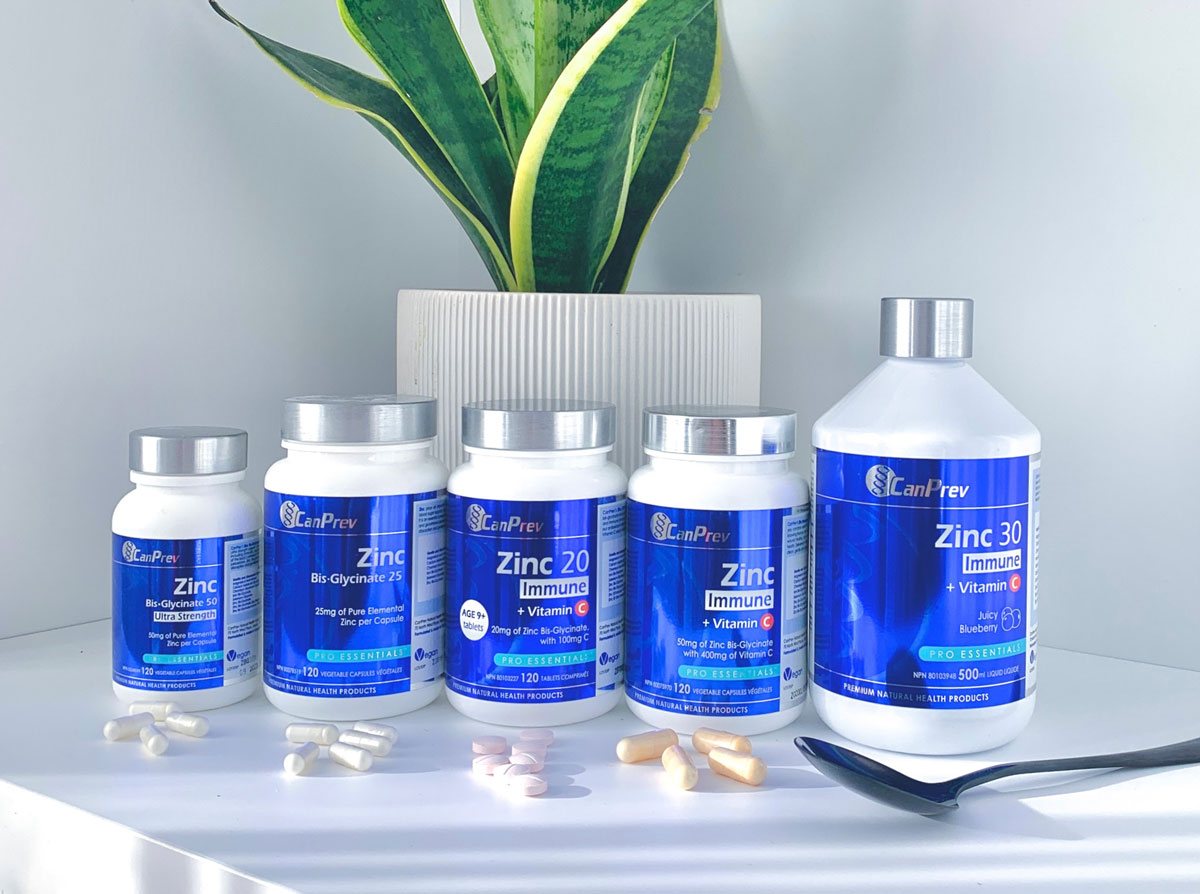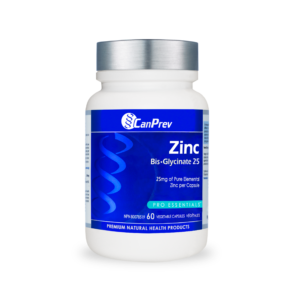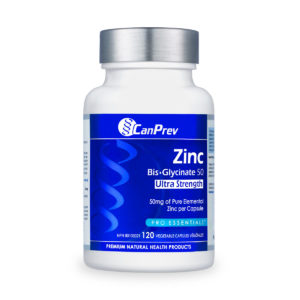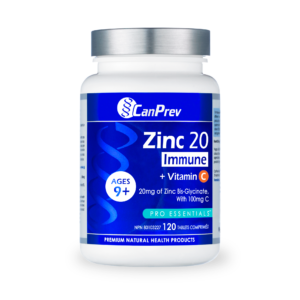Maintaining good health is often boiled down to eating a healthy diet, getting regular exercise and staying hydrated. But where does zinc fit in? Zinc is an essential nutrient – this means that the human body does not produce it, but it’s vital to our overall health.
This mighty trace mineral plays a crucial role in the body’s immune and detoxification processes, and is involved in over 300 enzymatic reactions. It helps to maintain healthy blood sugar levels by stabilizing insulin, and works to keep your thyroid functioning as it should. Zinc also pitches in when it comes to reproductive health, wound healing, growth, vision, taste, and smell.
That’s a lot of big jobs for one unassuming mineral to take on!
The primary benefits of zinc
Fertility and pregnancy
Both ovum and sperm rely on adequate concentrations of zinc for proper development. In men, zinc assists in managing testosterone levels. This mineral also plays an important role in women’s fertility by aiding conception and maintaining a healthy pregnancy, as zinc deficiency has been associated with negative birth outcomes, such as low birth weight.
Cognitive function and mood
Cognitive development and maintenance as well as synaptic transmissions rely on adequate levels of zinc. Serum levels of zinc tend to be lower in individuals with Alzheimer’s and Parkinson’s disease. Deficiency can also show up as inflammation, brain fog, and ADHD.
Thyroid support
Zinc is an important cofactor involved in thyroid hormone production. Supplementation can help maintain healthy levels of TSH and assist in T4 to T3 conversion. Its anti-inflammatory action and effect on white blood cells helps to prevent autoimmunity.
Digestion and gut health
Zinc is involved in the production of digestive enzymes that help in the metabolism of proteins, fats and carbohydrates. This powerful mineral is also a key factor in epithelial cell repair, the cells that line our digestive tract.
Skin health
Zinc can be helpful for a wide variety of skin issues ranging from acne to psoriasis. With any health concern, getting to the root cause is key. Inflammation, hormonal imbalance, and immune dysfunction all have the potential to be the cause of certain skin conditions, and zinc is crucial to navigating these three conditions.
What does zinc deficiency look like?
Since it’s involved in so many bodily functions, a deficiency in zinc can manifest itself in multiple different ways.
Signs and symptoms of deficiency:
- Skin issues such as acne, eczema, and psoriasis
- White spots on nails
- Decreased sense of smell and taste
- Low immune function, as identified by frequent colds and flus
- Loss of appetite
- Low energy
- Delayed growth in children
- Peptic ulcers
- Slow wound healing
- Declining memory
The causes of zinc deficiency can vary, depending on diet, lifestyle choices and other factors.
Potential causes of deficiency:
- Diet low in zinc or too high in copper
- Certain medications, such as birth control pills
- High alcohol intake
- Stress on the mind and body
- Surgery, serious illness or injury
- Pregnancy and breastfeeding
- Low stomach acid
- A vegetarian or vegan diet
Dietary sources of zinc
As with most nutrients, it’s best to obtain your vitamins and minerals from your diet
Sources of dietary zinc include:
- Seafood, specifically oysters, lobster, and crab
- Sustainable beef
- Beans
- Chicken (dark meat only)
- Pumpkin seeds
- Nuts like cashews and almonds
- Oats
For those who follow a plant-based diet, it can be tricky to get enough dietary zinc to sustain healthy levels because zinc is more bioavailable in animal proteins. As such, a vegetarian diet may not completely fulfill the body’s zinc requirements. That’s where supplementation comes in.
Considerations for zinc supplementation
When introducing any new supplement into your routine, it’s important to consult with your healthcare practitioner. They will have a good idea of your zinc requirements, and can make a customized recommendation for you.
In addition, there are a couple of things to keep in mind when taking zinc supplements.
Copper and iron absorption
Zinc, copper and iron can compete in the digestion tract for absorption, since they use the same receptor sites. Consuming too many of these minerals in high volumes at the same time may lead to deficiencies or depletions in the long term.
Delivery format
There are generally two formats for zinc supplementation: capsules and tablets.
Capsules tend to be easier to swallow, and break down more quickly than tablets. They can also be opened and mixed with water for those who have trouble swallowing pills. Pro tip: if you have a sore throat, open your zinc capsule, mix it with water and gargle the solution for a few seconds before swallowing.
With tablets, the dose is more modifiable. They’re easy to cut in half, and this can be done to moderate the dose, or if you struggle to swallow tablets.
When to take them
Health Canada recommends taking zinc supplements with food, and away from iron and calcium containing supplements. As a general rule of thumb, it is best to take any natural health supplements away from other medications (typically 2-3 hours apart).
Choosing a zinc supplement
Not all supplements are created equal. Depending on your health goal, find a zinc supplement that features zinc bis-glycinate as it is more gentle and easier to be absorbed in the digestive tract.
Zinc Bis-Glycinate 25 provides a daily dose for general support, and is great for individuals looking to support healthy immune function or improve skin issues. It plays an important role in “tapping the brakes” to avoid an out-of-control immune response, and is thought to prevent the rhinovirus (common cold virus) from multiplying in the upper respiratory system. A steady 25mg dosage is often used as part of a preventative protocol.
If you’re looking for something a little stronger, Zinc Bis-Glycinate 50 Ultra Strength provides stronger support for acute needs. Zinc is crucial for the development and function of the immune system like white blood cells and natural killer cells. This supplement is best for short-term usage (approximately 6 weeks), and should be taken at the onset of cold and flu symptoms. Since zinc assists with collagen formation and epithelial tissue repair, this formula is also a great addition to a leaky gut protocol, for use when dealing with skill issues, and to encourage wound healing.
The combination of vitamin C and zinc in Zinc 20 Immune + Vitamin C, supports several key functions in your body. This includes repair of tissues, wound healing, and most notably, maintaining your immune system. Vitamin C and zinc both have antioxidant activity, which are essential to good health. Zinc is an important part of superoxide dismutase (SOD), which reduces the harmful effects of free radicals. This paring is important during times of stress, in preparation for allergy symptoms, or cold and flu season. If you’re not a fan of capsules, you can try our Zinc 30 Immune + Vitamin C liquid formula.
Want to know more?
To learn more about zinc, its various roles in our body and how to recognize symptoms of a deficiency, visit zinc.ca












Leave A Comment